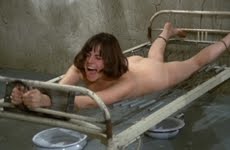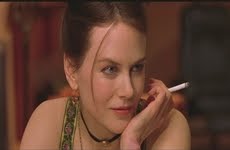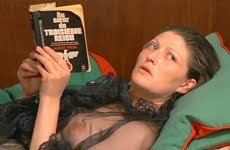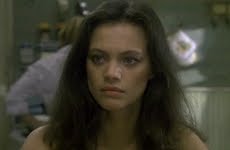 |
Mantra: Looks like that scene from Joan Of Arc (1999), innit?
|
 At a glance:
At a glance:
Santau (2009) gets a thematic sequel with
Mantra (2010), Metrowealth’s 38th in its catalogue and one that wishes to echo the RM 4.3 million success
(collections from Malaysia, Singapore and Brunei) of the first movie last year. In
Mantra, Zul Suphiaan (stage name
Zul Handy Black, the dodgy
neighbour in
Santau) plays Muzir, a man who gets involved with dark
powers and inadvertently gets thrown into jail for a crime. He loses his
wife (
Ana Dahlia) and while to another man, his one-time friend Hasbi
(
Hasnul Rahmat). In Pudu Jail (yes, you get to see several scenes shot
inside it before its famous demolishin) he dabbles with the occult
again by learnin black magic from an old prisoner (
Rozaidi Abdul
Rahman). With his newfound powers, Muzir manages to poison the warden
(
Hamdan Haji Ramli) and frees himself to seek revenge and reclaim his
family.
Bad news on the doorstep:
 |
| Zul Handy Black |
The recycled horror formula is simple – take an original research
about black magic and add a strong revenge theme with an all-new cast of
fresh faces, lettin it all bake in some decent CGI and sound work. You
can say
Mantra is better than
Santau in all aspects, and can even lay
claim to some artistic respectability due to its difficulty in producin
– save for one sore point which is minimal character development,
resultin in a compromised storyline. In the earlier 2009 film, the CGI
work and the performance of its lead actors may not have been better but
there were clear cut protagonists and antagonists who were easy to
follow. In
Mantra, the focus on the titular subject may (to the point
of using “real” chants and incantations) seems to have backfired
considerin the approach has come off a little too successful, takin
away the appreciation of the 89-minute feature film as a whole. In other
words,
Mantra commands respect for its faithful adherence to the
demonic subject but in terms of entertainment, we may not remember it as
a particularly scary or successful film.
 |
| "Did you or did you not pick up the bar of soap?" |
Reminds me of:
The movie is one of the last to be filmed in the now demolished colonial relic Pudu Jail in Kuala Lumpur. Wished I had the chance to visit it but it was too late.
Amacam joker, berapa bintang lu mau kasi?
In a nutshell,
Mantra was probably a hell of a script but this
screenplay doesn’t give it an engagin justification.
Santau had a
certain
Stephen King appeal to it but
Mantra just comes off more like a
dramaticised documentary. Let’s hope the next horror movie from Metrowealth –
Ngangkung – will set it right.
★★★
Bonus material:
 The five-star performances in Aftershock (includin
Zhang Jing Chu's role as the adult daughter) are a definitely highlight,
not to mention its high entertainment value in balancin drama and
action, just like Assembly. One can only hope that movies such
as this, despite the fiction, serve to remind people the importance of
family and just how much emotional resonance is left behind by natural
disasters. Aftershock is a first grade tearful testament to that.
The five-star performances in Aftershock (includin
Zhang Jing Chu's role as the adult daughter) are a definitely highlight,
not to mention its high entertainment value in balancin drama and
action, just like Assembly. One can only hope that movies such
as this, despite the fiction, serve to remind people the importance of
family and just how much emotional resonance is left behind by natural
disasters. Aftershock is a first grade tearful testament to that.































_010.jpg)



